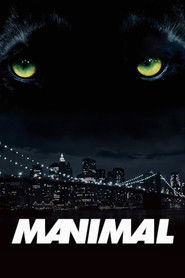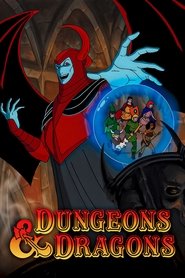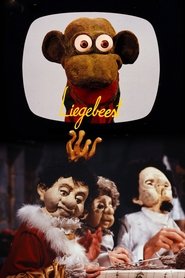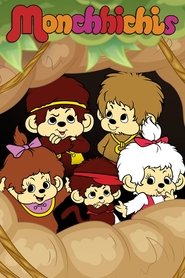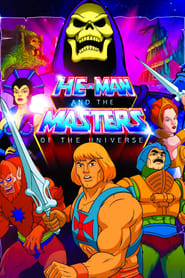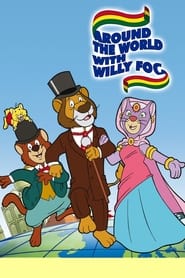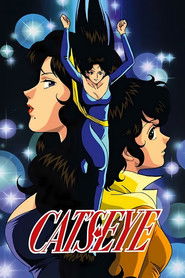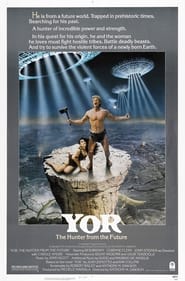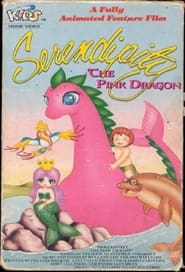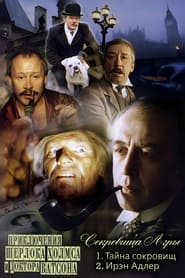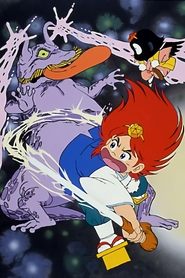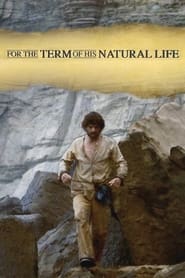New Action TV Series on Tub Tv - Page 413
-
Manimal
1983
Manimal
1983
star 7.3Jonathan Chase was a British college professor at New York University who had the unusual ability to transform into any kind of animal. He used his powers to battle crime alongside pretty policewoman Brooke and Vietnam-war pal Ty. -
Hardcastle and McCormick
1983
star 6.4Hardcastle and McCormick is an American action/drama television series from Stephen J. Cannell Productions, shown on ABC from 1983 through 1986. The series stars Brian Keith as Judge Milton C. Hardcastle and Daniel Hugh Kelly as ex-con and race car driver Mark "Skid" McCormick. The series premise was somewhat recycled from a previous Cannell series, Tenspeed and Brown Shoe. -
Dungeons & Dragons
1983
Dungeons & Dragons
1983
star 7.9Six friends are transported into the Dungeons & Dragons realm and must try to find a way home with the help of their guide 'Dungeon Master'. -
G.I. Joe: A Real American Hero
1983
star 7.6G.I. Joe: A Real American Hero is a half-hour American animated television series based on the successful toyline from Hasbro and the comic book series from Marvel Comics. The cartoon had its beginnings with two five-part mini-series in 1983 and 1984, then became a regular series that ran in syndication from 1985 to 1986. Ron Friedman created the G.I. Joe animated series for television, and wrote all four miniseries. The fourth mini-series was intended to be a feature film, but due to production difficulties was released as a television mini-series. -
Liegebeest
1983
-
Monchhichis
1983
Monchhichis
1983
star 6.3Hanna-Barbera monkeyshines about the Monchhichis, creatures that live in tall trees and have enemies called Grumplins. -
Inspector Gadget
1983
Inspector Gadget
1983
star 6.9Inspector Gadget is a clumsy, dim-witted human cyborg detective with various bionic gadgets built into his body. Gadget stumbles around working the cases while his niece and dog do most of the investigating. Gadget's arch-nemesis is Dr. Claw, the leader of an evil organisation, known as "M.A.D." -
He-Man and the Masters of the Universe
1983
star 7.3When Adam, Prince of the planet Eternia, raises his magic sword he transforms into He-Man (the most powerful man in the universe). With his allies and friends, he battles the evil Skeletor and his minions to protect the secrets of Castle Grayskull. -
Around the World with Willy Fog
1983
star 7.4Willy Fog is a British millionaire who bets that he will be able to go around the world in only eighty days. -
Cat's Eye
1983
Cat's Eye
1983
star 6.9Cat's Eye is the most notorious group of art thieves in Japan. No one knows their identities, but for most of Tokyo, the mystery only heightens their allure. -
Psycho Armor Govarian
1983
star 5.5Psychic youths to use their talents to defend earth against the oncoming Garadian invasion. Of course, there will be robots. -
Super Dimension Century Orguss
1983
star 7.8Kei Katsuragi's only concern is the love of his life. It doesn't really matter to him that he has more than one love - after all, as a pilot for the Freedom Space Corps, he might be dead tomorrow! In the future, war has changed, and Kei is all too familiar with the horrors it can bring. Atomic, biological, and chemical weapons are all in use, but even worse than those are the dimensional weapons, ordnance capable of tearing apart even time and space! -
The World of Yor
1983
The World of Yor
1983
The World of Yor (Italian: Il mondo di Yor) is a 1983 Italian fantasy adventure miniseries created and written by Antonio Margheriti for RAI 1. The four-part serial, based on Eugenio Juan Zappietro and Juan Zanotto's 1974 Argentine comic series Yor the Hunter (Henga el cazador), would later be edited into a feature-length film, Yor: The Hunter from the Future. Yor is an extremely blond prehistoric warrior who comes to question his origins, particularly with regard to a mysterious medallion he wears. When he learns of a desert goddess who supposedly wears the same medallion, Yor decides that he must find her and learn his true identity. Along the way, he encounters ape-men, dinosaurs, and a strange futuristic society. -
Serendipity The Pink Dragon
1983
star 7Serendipity the Pink Dragon is a 26-episode anime TV series produced by NTV and Zuiyo which aired weekly from 1 July 1983 to 23 December 1983 in Japan. The series was based on the Serendipity books by Stephen Cosgrove. After a boy is shipwrecked on a deserted island, he finds a pink egg which hatches into the pink dragon Serendipity. The series follows their adventures on the island. A feature-length English dub consisting of episodes from the TV series, directed by Jim Terry, was released on home video in the United States in 1989 by Celebrity Home Entertainment. The boy's name was changed from Kōna to "Bobby" in the English version. The TV series itself has also been aired in France, as Biniky le Dragon Rose, in Italy as Rosaura and in Iran as Serendipity. -
The Adventures of Sherlock Holmes and Dr. Watson: The Treasures of Agra
1983
star 7.8The fourth part of the Soviet TV series based on Arthur Conan Doyle's stories about Sherlock Holmes. The film was shot based on the story "The Sign of Four" and the story "A Scandal in Bohemia". -
بوجي وطمطم
1983
بوجي وطمطم
1983
هو مسلسل عرائس مصري من تأليف وإخراج الراحل رحمي، كان له تأثير كبير في ثقافة الطفل المصري والعربي وقد حاز المسلسل علي متابعة الصغار والكبار، حيث ارتبط بوجدان الطفل لسنوات طويلة في ليالى شهر رمضان، حيث كان له الفضل في ارتباط الطفل المصري بعروسة مصرية خالصة من البيئة المصرية الاصيلة مما كان له أكبر الاثر في مواجهة الثقافات الغربية. صور مسلسل بوجي وطمطم في ثمانيات القرن العشرين حيث كان أول إنتاج له مسلسل عن السلوكيات وكان ذلك في عام 1983 وتوالت الاجزاء بعد ذلك (حوالي 18 جزء)..ومنها: بوجي وطمطم في رمضان الفيل الجميل محطة فلافيلو حكايات مع بوجي وطمطم الفانوس السحرى بو� -
Plawres Sanshiro
1983
Plawres Sanshiro
1983
star 8Plawres is a wrestling game that the players make their robots, which are about 30 cm tall, fight in the ring. The main character, Sugata Sanshiro, is a plawres player. Using his plawrestler, Juohmaru, he beats strong rivals. -
Little Big Nose
1983
Little Big Nose
1983
Tenmaru is the prince of the monster world who has accidentally let out to the human world, 108 atrocious monsters that were sealed in. In order to return them, he went to the human world with his follower. -
For the Term of His Natural Life
1983
star 5.9In 1830s England, a young man from a good but troubled family is unjustly convicted of stealing a watch. He's transported to Van Diemen's Land where he suffers under the enmity of Lt. Frere while falling in love with Sylvia, the Warden's daughter. Meanwhile, back in England, an imposter lays claim to the young man's inheritance.
 Netflix
Netflix
 Amazon Prime Video
Amazon Prime Video
 Apple iTunes
Apple iTunes
 Apple TV Plus
Apple TV Plus
 Disney Plus
Disney Plus
 Google Play Movies
Google Play Movies
 Paramount Plus
Paramount Plus
 Hulu
Hulu
 HBO Max
HBO Max
 YouTube
YouTube
 fuboTV
fuboTV
 Peacock
Peacock
 Peacock Premium
Peacock Premium
 Amazon Video
Amazon Video
 The Roku Channel
The Roku Channel
 AMC+
AMC+
 Kocowa
Kocowa
 Hoopla
Hoopla
 The CW
The CW
 Vudu
Vudu
 Starz
Starz
 Showtime
Showtime
 PBS
PBS
 Pantaflix
Pantaflix
 FXNow
FXNow
 Tubi TV
Tubi TV
 Kanopy
Kanopy
 Comedy Central
Comedy Central
 Crunchyroll
Crunchyroll
 Microsoft Store
Microsoft Store
 Redbox
Redbox
 Sun Nxt
Sun Nxt
 ABC
ABC
 DIRECTV
DIRECTV
 Crackle
Crackle
 Fandor
Fandor
 Plex
Plex
